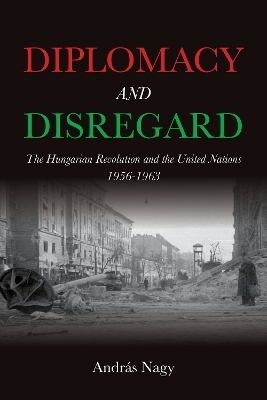
Diplomacy and Disregard
The Hungarian Revolution and the United Nations 1956–1963
Seiten
2025
Indiana University Press (Verlag)
978-0-253-07028-9 (ISBN)
Indiana University Press (Verlag)
978-0-253-07028-9 (ISBN)
- Noch nicht erschienen (ca. August 2025)
- Versandkostenfrei
- Auch auf Rechnung
- Artikel merken
Between 1956 and 1963, the United Nations grappled with the "Hungarian question"; namely, what it should do about the events and aftermath of the country's 1956 Revolution. Cold War tensions, anxieties over the concurrent Suez crisis, and ignorance and indifference about Hungary influenced how UN member states responded to this "internal affair" and its potentially dangerous effects on international relations.
Diplomacy and Disregard draws upon previously inaccessible documents, including UN archival materials, Hungarian government and secret service papers, and personal collections held by UN officials across the globe, to reveal the UN's contradictory rhetorical and practical responses to the Hungarian Revolution. Through detailed overviews alongside case studies of individual diplomats and specific controversies, András Nagy traces the UN's reactions to Hungarian and Soviet authorities' blocking of resolutions and denunciation of the UN as an enemy power, its need to use the International Committee of the Red Cross as a channel for its humanitarian aid, and its inability to legitimize revolutionary leaders and allow them to represent and act on Hungary's behalf. Reports riddled with inconsistencies, failures to call emergency sessions and fulfill information requests, and lackluster responses to known acts of terror and espionage demonstrated that even at its highest levels of leadership, the UN was not only unable to intervene against the Soviet-supported government but was often unwilling to do so.
Diplomacy and Disregard provides an unprecedented look at the global reach and consequences of Hungary's 1956 Revolution and at how the UN's action and inaction during this political crisis ultimately defined its ability to maneuver the Cold War's fraught political landscape and live up to the ideals of its charter.
Diplomacy and Disregard draws upon previously inaccessible documents, including UN archival materials, Hungarian government and secret service papers, and personal collections held by UN officials across the globe, to reveal the UN's contradictory rhetorical and practical responses to the Hungarian Revolution. Through detailed overviews alongside case studies of individual diplomats and specific controversies, András Nagy traces the UN's reactions to Hungarian and Soviet authorities' blocking of resolutions and denunciation of the UN as an enemy power, its need to use the International Committee of the Red Cross as a channel for its humanitarian aid, and its inability to legitimize revolutionary leaders and allow them to represent and act on Hungary's behalf. Reports riddled with inconsistencies, failures to call emergency sessions and fulfill information requests, and lackluster responses to known acts of terror and espionage demonstrated that even at its highest levels of leadership, the UN was not only unable to intervene against the Soviet-supported government but was often unwilling to do so.
Diplomacy and Disregard provides an unprecedented look at the global reach and consequences of Hungary's 1956 Revolution and at how the UN's action and inaction during this political crisis ultimately defined its ability to maneuver the Cold War's fraught political landscape and live up to the ideals of its charter.
András Nagy is Associate Professor in the Department of Theater Studies and the Department of Modern Philology and Social Sciences at the University of Pannonia.
Preface
Introduction
1. The 1956 Revolution and Its Prospects
2. The Crisis in Hungary and Attempts for Resolution
3. Responses to the Hungarian Crisis by the UN
4. The Attempts of the UN to Solve the Hungarian Crisis
5. Controversies and Compromises inside the UN
6. The Report of the Special Committee on the UN Agenda
7. Povl Bang-Jensen
8. The "Silence" of the UN and the Tragedy That Broke It
9. Epilogue: The Solution of the Hungarian "Problem"
Conclusion
Biographies of the More Important Personalities
Bibliography
Index
| Erscheint lt. Verlag | 5.8.2025 |
|---|---|
| Reihe/Serie | Studies in Hungarian History |
| Zusatzinfo | 22 b&w illus. |
| Verlagsort | Bloomington, IN |
| Sprache | englisch |
| Maße | 152 x 229 mm |
| Themenwelt | Geisteswissenschaften ► Geschichte ► Regional- / Ländergeschichte |
| Sozialwissenschaften ► Politik / Verwaltung ► Europäische / Internationale Politik | |
| Sozialwissenschaften ► Politik / Verwaltung ► Politische Systeme | |
| Sozialwissenschaften ► Politik / Verwaltung ► Politische Theorie | |
| ISBN-10 | 0-253-07028-7 / 0253070287 |
| ISBN-13 | 978-0-253-07028-9 / 9780253070289 |
| Zustand | Neuware |
| Informationen gemäß Produktsicherheitsverordnung (GPSR) | |
| Haben Sie eine Frage zum Produkt? |
Mehr entdecken
aus dem Bereich
aus dem Bereich
Erinnerungen
Buch | Softcover (2024)
Pantheon (Verlag)
CHF 22,40


